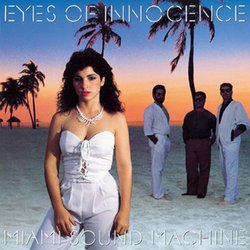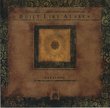| All Artists: Miami Sound Machine Title: Eyes of Innocence Members Wishing: 0 Total Copies: 0 Label: Epic Japan/Zoom Release Date: 7/14/2009 Album Type: Extra tracks, Import Genres: Pop, Latin Music Styles: Dance Pop, Adult Contemporary, Latin Pop Number of Discs: 1 SwapaCD Credits: 1 |
Search - Miami Sound Machine :: Eyes of Innocence
 | Miami Sound Machine Eyes of Innocence Genres: Pop, Latin Music
Japanese only paper sleeve pressing features all new 2009 remastering and bonus material. Sony. |
Larger Image |
CD DetailsSynopsis
Album Description Japanese only paper sleeve pressing features all new 2009 remastering and bonus material. Sony. Similar CDs
|
CD ReviewsSimple pop music, plain and simple! diesfaustus | Toronto, ON Canada | 05/29/2005 (5 out of 5 stars) "I first bought this CD in October 1991 after buying "Exitos de Gloria Estefan" the month earlier, as I was interested in listening to Miami Sound Machine's music starting from this first all-English LP on the CBS label. To be honest, I find this to be a far superior album than the one which followed, 1985's "Primitive Love", in terms of pop music. It's just a shame that this LP didn't get the recognition it should have deserved!
It isn't really appropriate to deem this album as the first to feature all-original recordings because most of the material had previously appeared on three of the four LPs the group recorded for the Miami-based CBS Discos International. The only original song written for this LP is Enrique E. García's "Prisoner of Love"! Seven of the ten songs originally appeared on the group's 1983 LP "A toda máquina", "OK" first appeared in Spanish on the 1982 LP "Rio", and "I Need Your Love" first appeared as "Regresa a mí" on the 1980 LP "Miami Sound Machine." Depending on your point of view, the English versions of these songs are either better, equal to, or of a vastly different quality than the original Spanish version! This is what makes it an interesting experience for me when I listen to this, as I find myself constantly making comparisons between the two versions of one song. 1. Dr. Beat (originally on "A toda máquina") -A song employing a lot of what was to come with "Conga" a year later. 2. Prisoner of Love -The only original tune written for this LP. It's a lot of fun to listen to, and not smacking too much of sound from the early 80s. 3. OK -First released in Spanish on 1982's "Rio." Somehow Gloria Estefan's Spanish lyrics that she wrote for the "Rio" version seem so plain and therefore make the song sound that way. But when she sings Wesley B. Wright's original lyrics, she sounds more free with her interpretation. And some of Wright's lyrics are a little unique, which makes this version more interesting for me to listen to to. 4. Love me (originally "Entrégate" on "A toda máquina") -Some of the lyrics are essentially the same for both English and Spanish versions, but this version doesn't rely too heavily on brass instrumentation as the Spanish does. A simple ballad, but this version is a little more stripped down, and I prefer this one. 5. Orange Express (originally "A toda máquina" on "A toda máquina") -For the life of me, I can't figure out what possessed Wesley B. Wright to choose "Orange Express" as such a title for this English version of "A toda máquina", as it has nothing to do with what the lyrics are all about! I actually like both versions, but they're vastly different from each other; the Spanish version simply encourages people to get up and enjoy a party that's going on, one which you'll never forget once it finishes ("A toda máquina, vas a divertirte. A toda máquina, vamos a bailar") while Wright's English version relies so heavily on philosophy and striving for positive outcomes in life, or at least that what it seems like to me. This is one of my favourite tracks from the album, in English or Spanish. 6. I Need A Man (originally from "A toda máquina") -An OK song for me. Nothing more, nothing less. 7. Eyes of Innocence (originally "Los ojos del amor" from "A toda máquina") -The lyrics for both versions are pretty much express the same things, but the instrumental mixes for both songs are slightly different at the start, in between verses and at the end. Both versions are fun to listen to. 8. When Someone Comes Into Your Life (originally "Qué triste es volver a empezar" from "A toda máquina") -Another of the ballads that Gloria Estefan is famous for writing and singing, but the Spanish version (written with Emilio Estefan) seems to depict the heroine as holding a lot of unpleasant feelings regarding the breakup of her relationship, while the English version depicts the heroine as someone who holds no grudges over what has happened, and encourages her ex to make sure he finds someone who loves him just as much. Gloria wrote the English version herself, and she sings this version with much more conviction, in my opinion. 9. I Need Your Love (originally "Regresa a mí" from 1980's "Miami Sound Machine") -This was the very first track I ever listened to from this album when I first bought it. I had hoped that there would be an English version of "Regresa a mí" somewhere out there, and just by looking at the song titles at the back of the CD, I wondered if this would be it. Sure enough, it was! Enrique García's lyrics are far superior to the ones he wrote in Spanish, and Gloria Estefan sings this song with much more emotion and feeling than she does with "Regresa a mí." Not to say that I didn't like that song when I first heard it (in fact I do like it a lot), but somehow to me this sounds better. The same instrumental track is used for both English and Spanish versions. 10. Do You Want To Dance (originally "Comunicación" from "A toda máquina") -Here's an example of two very different sets of lyrics for an English and Spanish version of a song using the same instrumental track. I'm not saying the English version is bad, but here it's just a simple song getting people to get up and dance. The Spanish version "Comunicación" was about how people use two different languages to get their points across to others, and sometimes getting others upset when we do! The English version uses very little crowd sound effects, but in between the verses for the Spanish version, the band members talk to each other in sentences using both languages and the reactions elicited from each other are quite funny to hear, particularly towards the end of the song. So although "Do You Want To Dance" is just okay, I prefer its Spanish counterpart. All in all, I would recommend this CD to anyone who was interested in listening to Miami Sound Machine. It's a lot of fun and it's just simple pop music, plain and simple, as I mentioned in the title! But one should really study the comparisons between the English and Spanish versions of the songs if one understands and speaks both languages. One should also note that for CBS Discos International, not all of the four records that Miami Sound Machine released before "Eyes of Innocence" were exclusively in Spanish. Only 1981's "Otra vez" and "Rio" from 1982 are done completely in Spanish while 1980's "Miami Sound Machine" and 1983's "A toda máquina" (which first contained "Dr. Beat" and "I Need A Man")have tracks in English. " |

 Track Listings (10) - Disc #1
Track Listings (10) - Disc #1



